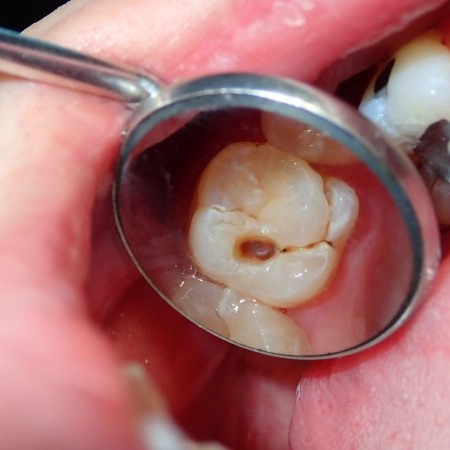
If you've ever had a dental implant or are considering getting one, you might have wondered: Do dental implants get cavities? The short answer is no. Dental implants do not cause cavities. Their composition and structure make them resistant to decay, unlike natural teeth. However, maintaining proper oral hygiene and regular dental check-ups are still essential for the overall health and longevity of dental implants. By following good oral hygiene practices and promptly addressing any issues that arise, you can ensure that your dental implants continue to serve you well for years to come, providing a natural-looking and durable solution for tooth replacement. Before delving into the specifics of dental implants, let's revisit what a cavity is. Dental cavities, also known as caries or tooth decay, occur when bacteria in the mouth produce acids that gradually eat away at the tooth's enamel. This process can result in the formation of small holes or cavities in the tooth. Dental implants are made of materials like titanium, which is not susceptible to decay like natural tooth enamel. However, this doesn't mean that the tissues surrounding dental implants are impervious to issues. While the implants themselves don't develop cavities, the gums and bone surrounding them can still be affected by periodontal disease if proper oral hygiene is not maintained. Even though dental implants don't get cavities, there are still signs that may indicate problems with your implant. These can include: If you experience any of these symptoms, it's crucial to consult your dentist promptly to address any potential issues with your dental implant. While dental implants may not be susceptible to cavities, their benefits extend beyond just cavity resistance. Dental implants provide several advantages, including: Dental implants look and feel like natural teeth, restoring your smile and confidence. Unlike dentures, dental implants function like natural teeth, allowing for better chewing and speaking abilities. With proper care, dental implants can last a lifetime, making them a reliable and cost-effective solution for tooth replacement. Although dental implants don't develop cavities, maintaining good oral hygiene is still essential to ensuring the longevity and health of your implants. Here are some tips for proper dental implant maintenance: Brushing your teeth, including dental implants, twice a day with a soft-bristled toothbrush helps remove plaque and bacteria without damaging the implant or surrounding tissues. Flossing is crucial for cleaning areas between teeth and around dental implants where a toothbrush may not reach. Water flossers can be particularly helpful for cleaning around implants, but traditional dental floss works well too. Choose a toothpaste specifically formulated for dental implants, as these are designed to be gentle on the implant surface while effectively cleaning the teeth and gums. dental implants themselves do not get cavities, it's crucial to maintain excellent oral hygiene to preserve the health and longevity of your implants. Regular check-ups and proper care are vital for ensuring your smile remains vibrant and your implants continue to function optimally. For personalized guidance on dental implant care and maintenance, schedule a consultation with Cambridge Dental today. Our experienced team is dedicated to providing exceptional dental care tailored to your unique needs. Visit our website at cambridge-dental to book your appointment and take the first step toward a confident and healthy smile. Your journey to long-lasting dental health starts here.What is a Cavity?
Can Tooth Decay Develop Around Dental Implants?
Indications of Dental Implant Issues
What Other Advantages Do Dental Implants Offer?
Improved appearance and self-esteem
Enhanced chewing and speech:
Long-term durability
Dental Implant Maintenance
Use toothbrushes with soft bristles
Water flosser or dental floss
Toothpaste for dental implants
Conclusion